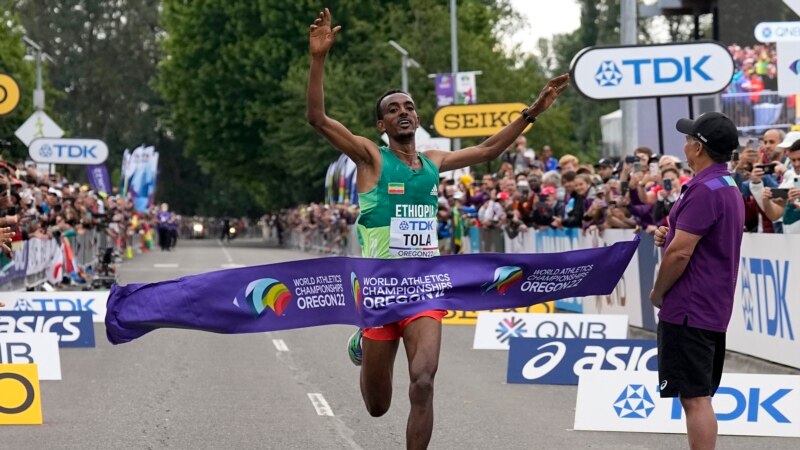One moment, Tamirat Tola was right there with the lead pack — shoulder to shoulder and shoe to shoe.
Then, he wasn’t. He left them that quickly. No catching him, either.
Tola led a 1-2 finish by Ethiopia in the men’s marathon at the world championships Sunday, opening a wide lead late in the race and cruising through the finish line.
The 30-year-old Tola finished in a championship-record time of 2 hours, 5 minutes, 36 seconds on a fast and flat course that featured plenty of scenic views to soak in. Teammate Mosinet Geremew held on for silver, finishing 68 seconds behind Tola. Bashir Abdi of Belgium captured bronze.
“I tried to prepare myself for a long time” for this, Tola said through an interpreter. “It was my dream.”
Even in dreams, rarely are wins by this convincing of a margin. Tola never glanced back after pulling away.
Well, maybe a few times. But no one was even close to catching up as the 2017 world silver medalist kept building and building on his lead. The previous championship record was 2:06:54, set by Abel Kirui of Kenya at the 2009 world championships in Berlin.
This is the sign of Tola’s domination: Geremew’s time eclipsed the championship record, too. It was another silver for Geremew, who finished runner-up at worlds in the heat of Doha in 2019.
“I’m very much happy because we own gold and silver,” Geremew said.
Again.
In 2019, Lelisa Desisa led the way for Ethiopia. On Sunday, though, the defending world champion tried to keep up but couldn’t maintain the pace. U.S. runner and University of Oregon standout Galen Rupp was in the lead group for much of the race before dropping back and finishing 19th. The 36-year-old Rupp received loud cheers from the fans who lined the course, some of whom followed along while riding bikes.
That was one way to keep up with Tola.
The real race was for silver, with the 33-year-old Abdi pushing Geremew all the way to the finish before running out of steam. Cameron Levins of Canada was fourth and Geoffrey Kamworor of Kenya wound up fifth. Kamworor is rounding back into form after recovering from a broken leg he suffered when he was hit by a motorcycle in 2020.
For Tebello Ramakongoana of Lesotho, it was quite a journey just to get to the starting line. He arrived in Portland after a roughly 40-hour trip, but his luggage didn’t make it. That included his running gear.
Sandra Cress, who was working the transportation operations desk in Portland for World Athletics, helped him secure socks, leggings and a pair of Nike shoes.
“It was fun to be able to follow him in the race, and he was easy to pick out as the only runner in white leggings,” Cress wrote in a text.
Ramakongoana finished 35th — and with a great story.
The runners were able to push pace with the temperature hovering at a comfortable 57 degrees Fahrenheit (13.9 Celsius) and cloud cover. That’s quite a contrast to the conditions at worlds in Doha when the men’s marathon was held at midnight to avoid the searing heat. The temperature was still around 84 degrees Fahrenheit (29 Celsius).
After a slight delay, 1972 Olympic marathon champion Frank Shorter signaled the start of the race that sent the runners along a three-loop course that finished in front of the University of Oregon’s Autzen Stadium. The route wound through the cities of Eugene and Springfield.
The course crossed over the Willamette River and ventured alongside Pre’s Trail, the bark running trail that’s named in honor of University of Oregon running icon Steve Prefontaine, who died in a car accident in 1975.
The field was missing Kengo Suzuki after the Japanese team had a few cases of positive tests for COVID-19. Also not racing was Kenyan marathoner Lawrence Cherono, who was provisionally suspended by the Athletics Integrity Unit after testing positive for a banned substance.

